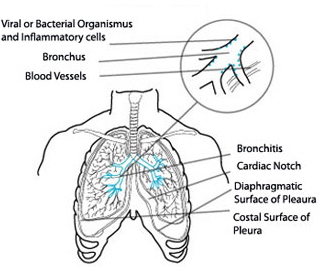Bronchitis
Bronchitis is inflammation of the mucous membranes of the bronchi, the airways that carry airflow from the trachea into the lungs. Bronchitis can be classified into two categories, acute and chronic, each of which has unique etiologies, pathologies, and therapies.
Acute bronchitis is characterized by the development of a cough, with or without the production of sputum, mucus that is expectorated (coughed up) from the respiratory tract. Acute bronchitis often occurs during the course of an acute viral illness such as the common cold or influenza. Viruses cause about 90% of cases of acute bronchitis while bacteria account for less than 10%.

Chronic bronchitis, a type of chronic obstructive pulmonary disease, is characterized by the presence of a productive cough that lasts for 3 months or more per year for at least 2 years. Chronic bronchitis most often develops due to recurrent injury to the airways caused by inhaled irritants. Cigarette smoking is the most common cause, followed by air pollution and occupational exposure to irritants.
Acute bronchitis
Acute bronchitis is most often caused by viruses that infect the epithelium of the bronchi, resulting in inflammation and increased secretion of mucus. Cough, a common symptom of acute bronchitis, develops in an attempt to expel the excess mucus from the lungs. Other common symptoms include sore throat, runny nose, nasal congestion (coryza), low-grade fever, malaise, and the production of sputum.
Acute bronchitis often develops during the course of an upper respiratory infection (URI) such as the common cold or influenza. About 90% of cases of acute bronchitis are caused by viruses, including rhinoviruses, adenoviruses, and influenza. Bacteria, including Mycoplasma pneumoniae, Chlamydia pneumoniae, and Bordetella pertussis, account for about 10% of cases.
Treatment for acute bronchitis is primarily symptomatic. Non-steroidal anti-inflammatory drugs (NSAIDs) may be used to treat fever and sore throat. Decongestants can be useful in patients with nasal congestion, and expectorants may be used to loosen mucus and increase expulsion of sputum. Cough suppressants may be used if the cough interferes with sleep or is bothersome, although coughing may be useful in expelling sputum from the airways. Even with no treatment, most cases of acute bronchitis resolve quickly.
As most cases of acute bronchitis are caused by viruses, antibiotics should not be used since they are only effective against bacteria. Using antibiotics in patients who do not have bacterial infections promotes the development of antibiotic-resistant bacteria, which may lead to greater morbidity and mortality. Antibiotics should only be prescribed if microscopic examination of Gram stained sputum shows large numbers of bacteria present.
Chronic bronchitis
Chronic bronchitis, a type of chronic obstructive pulmonary disease, is defined by a productive cough that lasts for 3 months or more per year for at least 2 years. Other symptoms may include wheezing and shortness of breath, especially upon exertion. The cough is often worst soon after awakening, and the sputum produced may have a yellow or green color and may be streaked with blood.
Chronic bronchitis is caused by recurring injury or irritation to the respiratory epithelium of the bronchi, resulting in chronic inflammation, edema (swelling), and increased production of mucus by goblet cells. Airflow into and out of the lungs is partly blocked because of the swelling and extra mucus in the bronchi or due to reversible bronchospasm.
Most cases of chronic bronchitis are caused by smoking cigarettes or other forms of tobacco. Chronic inhalation of irritating fumes or dust from occupational exposure or air pollution may also be causative. About 5% of the population has chronic bronchitis, and it is two times more common in males than females.
Chronic bronchitis is treated symptomatically. Inflammation and edema of the respiratory epithelium may be reduced with inhaled corticosteroids. Wheezing and shortness of breath can be treated by reducing bronchospasm (reversible narrowing of smaller bronchi due to constriction of the smooth muscle) with bronchodilators such as inhaled β-Adrenergic agonists (e.g., albuterol) and inhaled anticholinergics (e.g., ipratropium bromide). Hypoxemia, too little oxygen in the blood, can be treated with supplemental oxygen. However, oxygen supplementation can result in decreased respiratory drive leading to increased blood levels of carbon dioxide and subsequent respiratory acidosis.
The most effective method of preventing chronic bronchitis and other forms of COPD is to avoid smoking cigarettes and other forms of tobacco.
Treatment
- Non-steroidal anti-inflammatory drugs
- Nasal decongestants
- Mucolytic agents
- Cough suppressants









